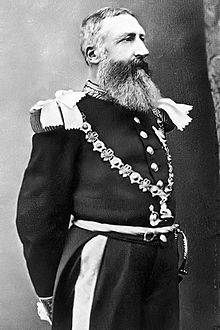
Back Leopold II van België Afrikaans Leopoldo II de Belchica AN Lēodbald II Belga Cyning ANG ليوبولد الثاني ملك بلجيكا Arabic ليوبولد التانى ملك بلجيكا ARZ Leopoldu II de Bélxica AST II Leopold Azerbaijani ایکینجی لئوپولد (بلژیک) AZB Леапольд II (кароль Бельгіі) Byelorussian Леополд II (Белгия) Bulgarian
| Leopold II | |||||
|---|---|---|---|---|---|
 Royal portrait, c. 1900 | |||||
| King of the Belgians | |||||
| Reign | 17 December 1865 – 17 December 1909 | ||||
| Predecessor | Leopold I | ||||
| Successor | Albert I | ||||
| Prime ministers | |||||
| Sovereign of the Congo Free State | |||||
| Reign | 1 July 1885 – 15 November 1908 | ||||
| Governors-general | |||||
| Born | 9 April 1835 Brussels, Belgium | ||||
| Died | 17 December 1909 (aged 74) Laeken, Brussels, Belgium | ||||
| Burial | |||||
| Spouses | |||||
| Issue Detail |
| ||||
| |||||
| House | Saxe-Coburg and Gotha | ||||
| Father | Leopold I of Belgium | ||||
| Mother | Louise of Orléans | ||||
| Signature |  | ||||
Leopold II (French: Léopold Louis Philippe Marie Victor; Dutch: Leopold Lodewijk Filips Maria Victor; 9 April 1835 – 17 December 1909) was the second King of the Belgians from 1865 to 1909, and the founder and sole owner of the Congo Free State from 1885 to 1908.
Born in Brussels as the second but eldest-surviving son of King Leopold I and Queen Louise, Leopold succeeded his father to the Belgian throne in 1865 and reigned for 44 years until his death, the longest reign of a Belgian monarch to date. He died without surviving legitimate sons. The current Belgian king descends from his nephew and successor, Albert I. He is popularly referred to as the Builder King (Dutch: Koning-Bouwheer, French: Roi-Bâtisseur) in Belgium in reference to the great number of buildings, urban projects and public works he commissioned.
Leopold was the founder and sole owner of the Congo Free State, a private project undertaken on his own behalf as a personal union with Belgium. He used Henry Morton Stanley to help him lay claim to the Congo, the present-day Democratic Republic of the Congo. At the Berlin Conference of 1884–1885, the colonial nations of Europe authorised his claim and committed the Congo Free State to him. Leopold ran the Congo by using the mercenary Force Publique for his personal gain. He extracted a fortune from the territory, initially by the collection of ivory and, after a rise in the price of natural rubber in the 1890s, by forced labour from the native population to harvest and process rubber.
Leopold's administration of the Congo Free State was characterized by atrocities and systematic brutality, including forced labour, torture, murder, kidnapping, and the amputation of the hands of men, women, and children when the quota of rubber was not met. In one of the first uses of the term, George Washington Williams described the practices of Leopold's administration of the Congo Free State as "crimes against humanity" in 1890.[1] These and other facts were established during Leopold's rule by eyewitness testimony, by on-site inspection from an international commission of inquiry, by the investigative journalism and activism of E. D. Morel, and by the 1904 Casement Report.
While it has proven difficult to accurately estimate the pre-colonial population and the amount by which it changed under the Congo Free State, estimates for the Congolese population decline during Leopold's rule range from 1 million to 15 million. The causes of the decline included epidemic disease, a reduced birth rate, and violence and famine caused by the regime.[2][3][4][5]: 225–233
In 1908, the reports of deaths and abuse, along with pressure from the Congo Reform Association and other international groups, induced the Belgian Government to take over the administration of the Congo from Leopold during the penultimate year of his rule. The Congo Free State was thus reconstituted as a new territory, the Belgian Congo.
- ^ Hochschild, A. King Leopold's Ghost: A Story of Greed, Terror and Heroism in Colonial Africa. Houghton Mifflin, 1999. pp. 111–112
- ^ "Controverse over standbeelden van Leopold II: Waarom is de Belgische koning zo omstreden?". VRT (in Dutch). 5 June 2020. Retrieved 10 August 2023.
- ^ Cite error: The named reference
Rentonwas invoked but never defined (see the help page). - ^ Cite error: The named reference
oz1rVwas invoked but never defined (see the help page). - ^ Cite error: The named reference
ghostwas invoked but never defined (see the help page).
© MMXXIII Rich X Search. We shall prevail. All rights reserved. Rich X Search